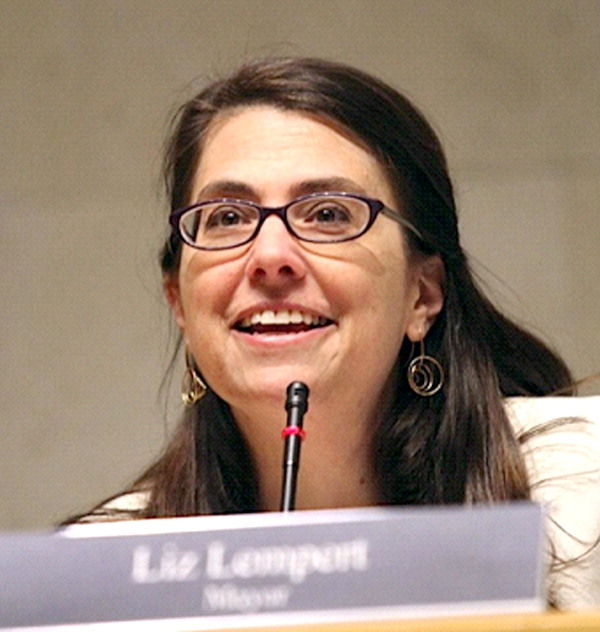By Philip Sean Curran, Staff Writer
Mayor Liz Lempert on Wednesday sought to make the case for a paid sick leave ordinance before an area business group, with her town looking to become the latest New Jersey community to require that private-sector employers provide the benefit to their employees.
“I think it’s important that we treat everybody who works in town fairly,” she said at a breakfast event hosted by the MidJersey Chamber of Commerce in the Nassau Inn. She repeated her support for such a requirement, one that exists, in some version, in about a dozen municipalities around the state.
Mayor Lempert said the town has heard “compelling testimony,” including from a local school nurse sharing stories of students.
“They’re fed Tylenol before they get dropped off to school, they have a raging fever, it spikes at 11 a.m. and nobody can pick up the child because they’re not allowed to leave work,” she said. “It’s a problem in our community and it affects all of us.”
Her comments, in response to a reporter’s question, come some two weeks before a committee of three council members charged with studying the issue is due to release a report with recommendations to the full governing body. That committee — consisting of Lance Liverman, Heather H. Howard and Patrick Simon — was supposed to release that report at Monday’s council meeting, but a full agenda that night led the matter to be postponed until the June 27 meeting, Mayor Lempert said.
Ms. Howard said Wednesday by phone that the committee had met with residents and businesses and spoken with representatives of two towns that have sick pay ordinances on the books, Jersey City and New Brunswick.
“It’s been a really productive process about learning about the needs of workers and businesses of our community,” she said.
While the committee has not disclosed its recommendations, a high-ranking Princeton Democrat said Wednesday on a condition of anonymity that there are enough votes on the governing body to support a sick pay ordinance. One question, however, will be how far-reaching any measure might go.
“We’re looking at some of the other models that are done in other parts of the state,” Mayor Lempert said in pointing to “issues” in implementing any such requirement on a municipal level.
In New Brunswick, for example, the sick pay ordinance applies to full- and part-time employees of businesses located in the city that have five or more full-time equivalents. “Each 35 hours worked by ‘part-time’ and ‘full-time’ employees equals one FTE,” according to the city web page.
Employees who average fewer than 20 hours per week, however, would not be eligible for the benefit, according to the city.
Newark, on the other hand, is more expansive; the measure there covers all employees who work more than 80 hours per year in the city, regardless of whether their employer is located in another municipality. The law exempts public-sector workers and construction union members who either are enrolled or graduated from a registered apprenticeship program and are in collective bargaining agreements.
Paid sick leave mandates have been opposed by business groups, including the one Mayor Lempert that spoke before.
“Businesses need to make these decisions for what’s best for them,” said Robert D. Prunetti, president and CEO of the MidJersey Chamber, after the mayor’s speech. “So if they want to maintain and retain good employees, they’ll have a sick policy. And most do.”
He said any ordinance applying to employees of companies outside of Princeton but who do work in town would “stifle business.”
Mayor Lempert spoke to the Chamber as part of a series the organization has to invite in local mayors to give speeches. In a roughly 15-minute-speech followed by audience questions and answers, she touched on the consolidation of the two communities, “a seminal event in our town’s history,” in her words.
She later said the town is home to incubators that serve as launchpads for start-up companies, Tigerlabs and Princeton University’s Entrepreneurial Hub.
“Both are reinvigorating the Princeton community as a center for entrepreneurship,” she said.

